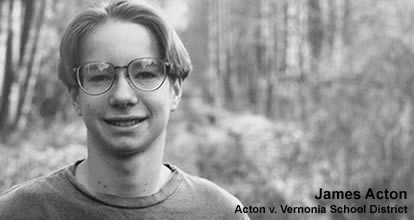Faces of Liberty: Student Challenges School's Drug Testing Policy

"The right of the people to be secure in their persons...against unreasonable searches...shall not be violated..."
- Fourth Amendment, Constitution of the United States
It was 1991. James Acton had just started seventh grade at Vernonia's Washington Grade School. One day that fall he came home and — like countless kids in a multitude of big and small places across the country — declared he wanted to play football for the school team.
That innocent act would mark the beginning, for James and his parents, of a battle for his constitutional right to privacy that would lead them on a long, winding and occasionally tumultuous journey through the courts.
It was to be James' first crack at interscholastic sports. His parents, Judy and Wayne Acton, were loathe to stand in the way of the slight young man's athletic ambitions. They took him to the doctor for his physical. And prepared to join the sideline cheering section.
There was one other thing, James confided. He would have to submit to a drug test. The Vernonia School District two years before had adopted a policy barring any student from district-sponsored athletic programs without a urinalysis for illicit drugs. No exceptions at the start of the season and random testing thereafter.
The Actons, who had been residents of the little logging town west of Portland for almost two decades, had followed the debate over the drug policy when it was first adopted, but had forgotten about it. Now they had a dilemma. Recalled Judy Acton:
"We said this is nuts. How come somebody hasn't challenged this? How come there wasn't a class action suit? We didn't quite understand why something hadn't happened. We went away for the weekend and we discussed it as a family. And we came to the conclusion that we were not going to sign the permission slip."
The policy was the school board's answer to what was seen by school administrators as a growing drug problem among school-age youth. It was affecting discipline in the classroom, they said. Leading student athletes were thought to be at the center of it and the school board feared a poisoning impact on the rest of the student population because of the central place school sports held in the community.
James — a good student who was not involved with drugs — didn't think he should have to take the test. It was the "intrusion" of it he didn't like.
He told a reporter:
"I was like one of the smartest kids in class. I never got a referral (to the principal's office)—and I thought that was proof enough for them to see I wasn't taking drugs. I didn't want to be forsaken from sports and decided I should do something."
With the support of the ACLU, James and his parents took the Vernonia School District to court.
They lost in U.S. District Court. But the Ninth Circuit Court of Appeals overruled the lower court and declared the school district had violated James' rights under the Fourth Amendment and the Oregon Constitution.
The school district appealed. And in 1995, in what by then had become a highly publicized case, the U.S. Supreme Court reversed the appeals court and ruled in Vernonia's favor. A subsequent request to send the case to the Oregon Supreme Court for a ruling on the legality of Vernonia's policy under the state constitution was denied by the Ninth Circuit.
Said James Acton:
"I think what we did is being made into a big deal. But I don't think it should be, because I think other people should do things like this also. For our nation to become better, more people have to stand up for the way they think it should be."
Photographer: Brian Foulkes
Writer: Harry Lenhart